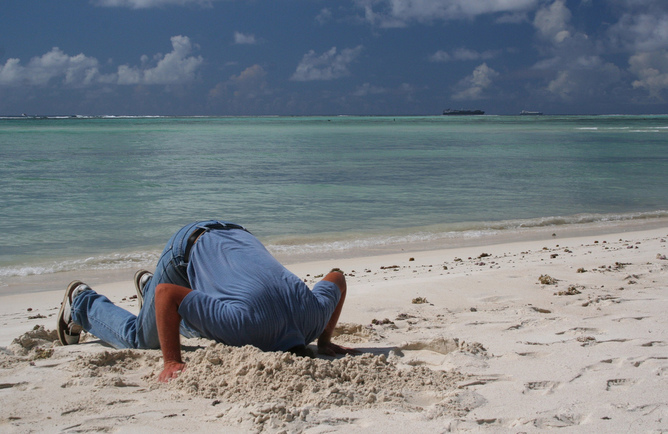Human Nature May Seal the Planet's Warming Fate (Op-Ed)


Raghu Murtugudde is executive director of the Chesapeake Bay Forecasting System at the University of Maryland Earth System Science Interdisciplinary Center (ESSIC) and a professor in the Department of Atmospheric and Oceanic Science. Murtugudde contributed this article to Live Science's Expert Voices: Op-Ed & Insights.
Slow changes are the bane of humanity. The metaphor of a frog in a pot being warmed slowly seems quite apt for the way humanity is struggling with global warming. 2014 is now the warmest year in the instrumental record. Even as the global warming hiatus continues and its causes continue to be debated — record temperature years have occurred during the hiatus, even though globally averaged surface temperatures have shown little change — the pause is not really a benign blessing to continue with our ways of consuming carbon-based fuels. Instead, we must finally change our entrenched way of thinking about this problem.
The climate is the cheese
In "Who Moved My Cheese?" (G. P. Putnam's Sons, 1998), motivational speaker Spencer Johnson tells an allegorical story of two mice and two miniaturized men, both charged with seeking cheese within the same maze.
Sniff and Scurry, the mice that run through the maze every day, remain forever prepared to seek cheese, even when discovering it in the same spot each day. Similarly, the little cheese-seeking men — Hem and Haw — who also discover the same cheese cache, eventually grow complacent and stop worrying about finding cheese. As often happens in nature, the cheese supply eventually begins to dwindle.
The mice can sense the coming change. Before it's too late, they run through the maze and find new cheese. The men, however, fail to notice the subtle collapse in the cheese supply until it's nearly too late. Haw, the more proactive of the little men, realizes that the cheese has all but disappeared and sets out in the maze to find new cheese. He learns a number of lessons along the way and does manage to both find new cheese and enjoy it as much as the old. Hem, however, remains unconvinced that the cheese will disappear. He also concludes that even if the cheese were to disappear, he wouldn't like the new cheese anyway.
The moral of the story is that even creatures like mice — with their simple brains — are biologically tuned to notice and rapidly respond to change, whereas humans — the most evolved life form — are bogged down by their unique ability to rationalize and reason. Some members of the species even resort to wholesale denial that change is well underway, even when said change is caused by their own actions.
Get the world’s most fascinating discoveries delivered straight to your inbox.
Change happens: our fondue planet
The parallels to humans and climate change are rather obvious. Humans are constantly seeking more and more comforts, even at the cost of irreversibly damaging the planet.
Less fortunate humans may, in fact, be more in tune with environmental changes and quicker to adapt, even when the changes result from overconsumption by the rich. Some humans are more sensitive to changes, even if they are late in responding to them. Others may resort to complete denial of the change itself or deny the need for action to avert change, especially when the thermostat is being discreetly adjusted. [Michael Mann: Climate-Change Deniers Must Stop Distorting the Evidence (Op-Ed )]
The lessons and insights learned by Haw in the cheese allegory can be similarly translated into insights required in our response to global warming. Climate change deniers often state that climate has always changed. This is factually accurate, and the "4.2-kiloyear" (kyr = 1,000 years) event is a clear example.
The so-called 4.2-kyr event was a century-long drought in 2200 B.C.E., which although naturally occurring, likely caused the demise of kingdoms in Egypt and Acadia. The event also had devastating effects on the extant civilizations in the Indus Valley and China.
Many recent civil and armed conflicts, from the Arab Spring to Darfur, can be attributed to climate events. Climate change will happen anyway, but humans are clearly causing several deleterious effects of that change to accelerate .
Anticipate change, monitor change
Global warming is happening and its many effects are already manifesting themselves, from extreme events to melting glaciers, from disappearing biodiversity to rising sea levels, and from acidifying oceans to the early arrival of spring.
More mindful attention is needed in anticipating region-specific changes and the differential vulnerabilities of different regions and nation states.
Weather forecasting and climate prediction/projections require sustained observations — both in situ (on site) and from remote sensors, such as aboard satellites — but despite the demonstrable economic value of weather and climate forecasts, financial resources seem to be permanently scarce. When it comes to investing in monitoring weather and climate, humanity must fight the tendency to hem and haw.
Adapt to change quickly
Climate change negatively affects global commons, such as the atmosphere and oceans, with regional and local changes being both positive and negative.
The slow rates of change, such as the global-average warming and sea-level rise, are not easily perceived as dangerous, and adaptations often require collective action and pooled resources.
Only time will tell if the global climate negotiation under the United Nations Framework Convention on Climate Change is moving fast enough. The climate system may also surprise us with abrupt changes, such as a California drought that lasts for decades. The consequences of not adapting quickly enough remain unknown.
It is quite likely that, barring a game changer that will revolutionize food and energy production, without exacerbating or accelerating global warming, humanity will need to fundamentally change its way of life in order to avoid the potentially catastrophic outcomes of global warming. From turning off the tap in the morning while brushing our teeth to turning the light off at bedtime, the rich and the poor alike will have to be mindful of water, energy and food consumption to stay on a safe trajectory and within planetary boundaries for sustainability.
Enjoy the change
Global warming requires hard decisions by politicians, based on the inherently uncertain information produced by climate scientists.
Humans must use their ingenuity to find ways to assimilate the changes needed to respond to global warming and make the planet bearable for all life forms. Humans have evolved to internalize norms and make them preferences, such as stopping at a red light in the middle of the night, even when no one is watching.
If humanity is to respond effectively to global warming, new norms must evolve. New technologies should lead to a higher quality of life that is enjoyable, in part because it is based on lower consumption rates. In this way, our current, high-consumption-rate standards of living can be slowly replaced as a way of life.
Considering the multidecadal and multicentury residence time of greenhouse gases and the propensity of the climate system to produce surprising, abrupt change, humanity will need to be ready to change quickly. And yet, humanity must rationalize the change as being an enjoyable and meaningful part of life, where quality is not defined by a head-in-the-sand approach to exploiting the global commons.
We are moving the thermostat, and many are refusing to accept that we are turning up the heat on ourselves and on all life on earth. The lessons learned by Haw in finding and enjoying the new cheese will serve us well: If we keep those lessons in mind, humans will use their ingenuity to help us dial back the thermostat and enjoy a new — and safe — temperature.
Follow all of the Expert Voices issues and debates — and become part of the discussion — on Facebook, Twitter and Google+. The views expressed are those of the author and do not necessarily reflect the views of the publisher. This version of the article was originally published on Live Science.



